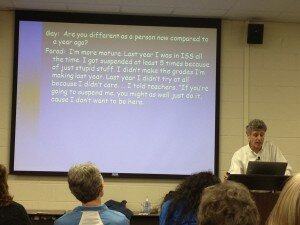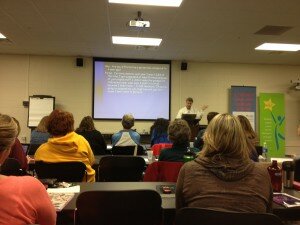A few weeks ago I had the opportunity to hear Peter Johnston, author of Choice Words and Opening Minds, speak. I read Johnston’s first book, Choice Words, during my student teaching, and I can honestly say that his ideas and suggestions have forever changed the way that I talk to kids. So, I was of course very excited to hear more. Here are a few thoughts and ideas that he shared that I want to bring to you.
1. There is a huge difference between, “You have not figured out that problem,” and “You have not figured out that problem, yet.” And likewise, there is a big distinction between, “How many books have you read?” and “How many books have you read so far?” A few words carefully placed change the entire framework of a thought or question. By adding “yet” you let kids know that you believe wholeheartedly that they will figure the problem out if they keep working at it. It encourages continued effort, rather than suggesting that some can do it, and others cannot. By adding “so far” you let kids know that their learning is a journey, not a destination. Simple, but powerful.
2. “Teachers can’t hide their human responses to student work. Students read these responses, and they confirm what students think of themselves.” For example, when we read something a student has written, we respond in a natural, human way. We are either interested and ask more, or we critique. Because this carries so much weight for kids, we need to reframe our thinking about what we are looking for. If we can be genuinely excited about the different effort we see, the human response will follow.
3.”Distribute your teaching around the classroom. Enlist other students as teachers.” Kids LOVE being the expert. And once they have been deemed an expert at something, they are likely not to forget it. If we can teach kids how to teach one another, we have done a few things. We, as teachers, have multiplied our resources tenfold. And, we have empowered out students. Everyone learns best when they are able to teach something to someone else. By creating an environment where we are all teachers, more learning takes place.
4.”If you want to stop engagement, ask comprehension questions. Focus on engagement. If they are engaged, comprehension will follow.” I remember each book I was forced to read through elementary school, and I still hate them all to this day. They were destroyed for me by a series of comprehension and vocabulary quizzes. If kids are deeply engaged in something, they will figure it out. They will talk to someone, reread, investigate. If they want to know what is going on, they will. We need to refocus on what is truly interesting to them.
5.”If a child is fully engaged in something and you praise them, then you shift their attention to pleasing you instead of the task.” Praise is a slippery slope. We want to become accomplished at noticing without judgment. And if a child is deeply engaged, they are not seeking praise.
6. The curriculum we are teaching children today is likely to be obsolete by the time they graduate. Facts and information change. We used to have nine planets, and now there are eight. Technology is constantly changing. When we were studying to be teachers, we could never anticipate that we would be using SMARTboards, ipads, Skype, and blogging with our students. Likewise, we cannot possibly predict what the future holds for our students, and what hard skills they will need.
Therefore, we need to reframe our teaching focus on the few things that we know kids will need. We must turn our curriculum on its head. Our focus must be on problem solving and teaching kids to work and think together. These are constants in a changing world.
I cannot recommend Peter Johnston’s work enough. Choice Words and Opening Minds (which I am still reading), have influenced me in immeasurable ways as I work with kids.
Please share your thoughts and reactions. Let’s make this a conversation!



Thanks for your thoughtful and thought-provoking post. I have earmarked these books for summer reading. Wish I had heard of them before my break. Either one could/would be a great book for a summer teacher book study! You game? I imagine there could be a great number of teachers who would sign up.
Happy Spring.
Sara
I would love to do a book study! Particularly on Opening Minds since it is his newest. The great thing about both books is that they are pretty quick, easy reads. Happy spring to you too!